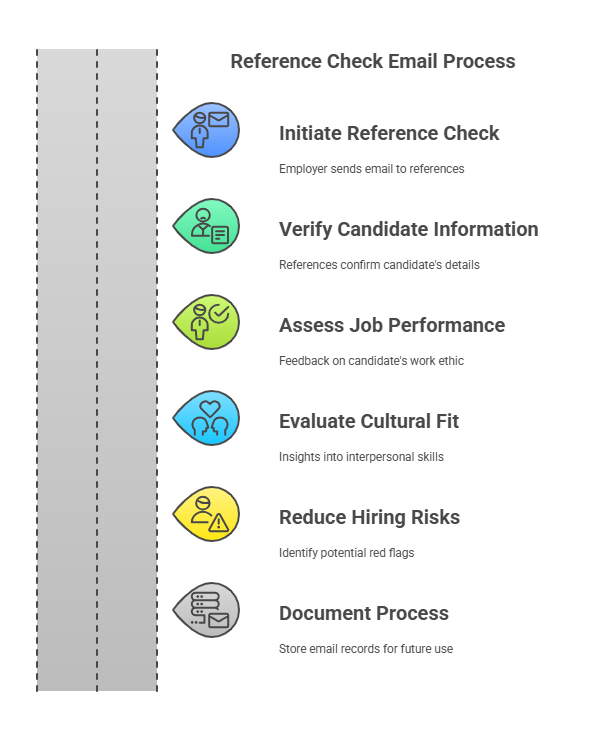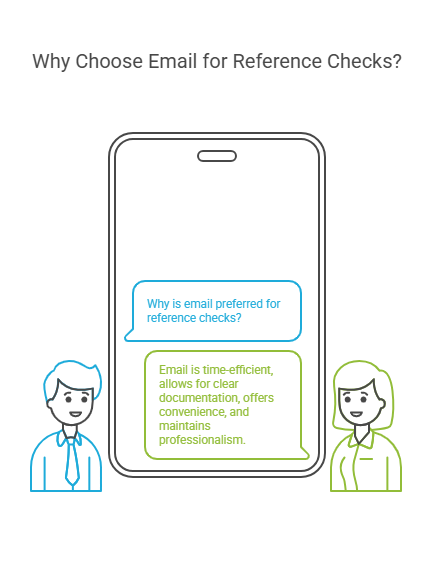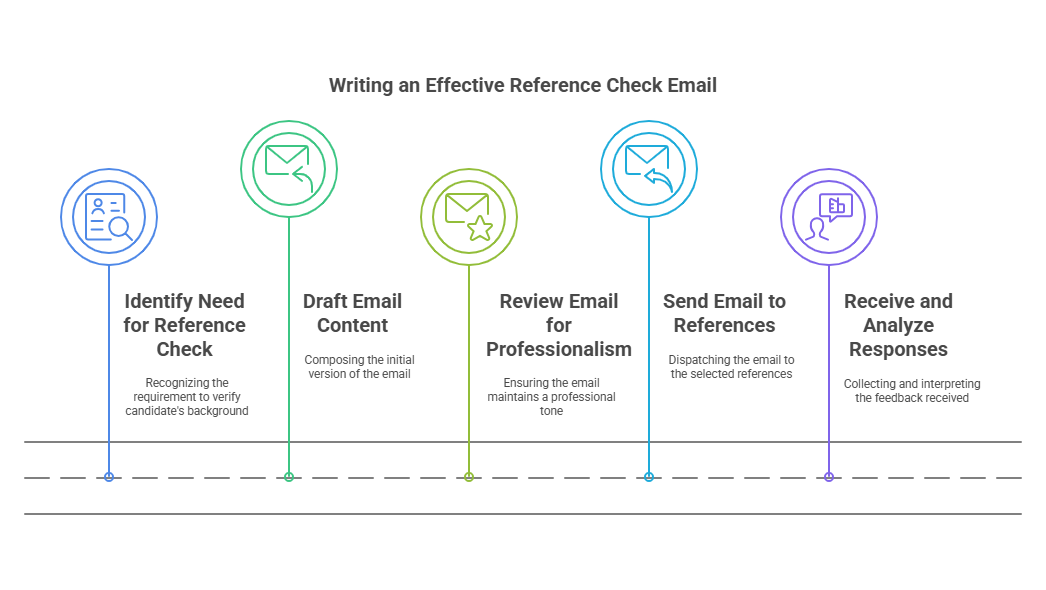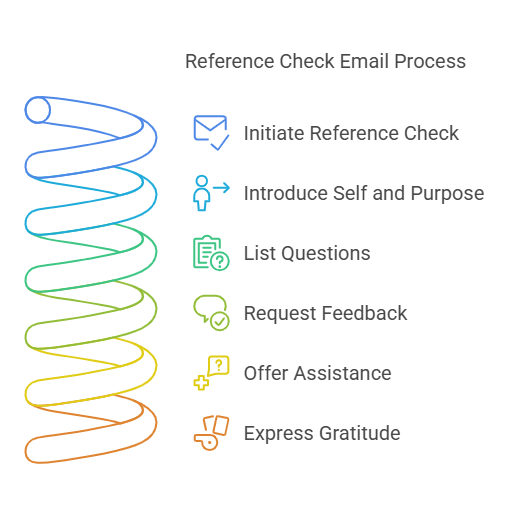How to Write an Effective Reference Check Email

What is a Reference Check Email and Why It’s Crucial for Employers?
A reference check email is a formal email sent by an employer or hiring manager to a candidate’s listed references to verify the details provided by the candidate during the hiring process. It serves as a tool for employers to validate the qualifications, work experience, and character of a potential employee. By gathering insights from past employers, colleagues, or other professional contacts, employers can assess the suitability of a candidate for a specific role.
Reference check emails are increasingly common because they offer several advantages over traditional phone calls or in-person reference checks. With the convenience and formality of email communication, employers can streamline their hiring process, ensuring that reference checks are thorough, documented, and accessible.
Importance of Reference Check Emails in the Hiring Process

Reference checks are an essential part of the hiring process because they provide a deeper understanding of a candidate’s professional background. Here are some key reasons why employers rely on reference check emails:
- Verifying Candidate Information:
Candidates often provide detailed information about their work history, skills, and accomplishments. A reference check email helps employers confirm the accuracy of these claims. - Assessing Job Performance:
A reference check offers insights into a candidate’s job performance, work ethic, and ability to meet deadlines. Previous employers or colleagues can provide valuable feedback on these aspects. - Evaluating Cultural Fit:
By contacting a candidate’s references, employers can learn about the candidate’s interpersonal skills, teamwork, and communication style. This helps determine if the candidate is a good fit for the company culture. - Reducing Hiring Risks:
A thorough reference check via email can help employers identify red flags that may not be apparent during interviews. This helps mitigate the risk of making poor hiring decisions. - Documentation for Future Reference:
Emails provide a written record of the reference check process, which can be stored for future reference or legal purposes, ensuring that the employer follows a consistent and fair hiring process.
Why Choose Email for Reference Checks?

While phone calls and in-person checks are still viable methods, email has become a preferred approach for many employers due to its efficiency and documentation benefits:
- Time-Efficient:
Employers can send reference check emails to multiple references at once, saving time compared to making individual phone calls. - Clear Documentation:
Email provides a written record of the entire reference check conversation, which can be reviewed later if needed. - Convenience:
Reference check emails can be sent at any time, allowing both the employer and the reference to respond at their convenience. - Professionalism:
Emails are a professional way to initiate reference checks, providing clear instructions and ensuring that all necessary information is captured.
How to Write an Effective Reference Check Email: A Step-by-Step Guide

When conducting reference checks for a potential employee, email can be a highly efficient and professional method of communication. Crafting a well-structured reference check email not only helps you gather necessary information about the candidate’s past performance but also maintains a professional tone throughout the process. Here’s a step-by-step guide to writing an effective reference check email:
Step 1: Choose a Professional Subject Line
Your subject line should be clear and concise, indicating the purpose of the email. A good subject line helps the recipient immediately understand the context of the request. Here are a few examples of subject lines you can use:
- “Reference Check for [Candidate’s Name]”
- “Request for Employment Reference: [Candidate’s Name]”
- “Verification of Employment for [Candidate’s Name]”
Step 2: Greet the Recipient Professionally
Start your email with a polite and professional greeting. If you know the recipient’s name, it’s always best to address them directly. For example:
- “Dear [Recipient’s Name],”
- “Hello [Recipient’s Name],”
If you don’t know the person’s name, “To Whom It May Concern” is a safe and professional option.
Step 3: Introduce Yourself and Provide Context
In the first paragraph, introduce yourself and explain the reason for your email. Be sure to include details such as your name, role, and the organization you work for. Clearly explain why you are reaching out to the recipient and why you are requesting a reference check.
Example:
” My name is [Your Name], and I am a [Your Position] at [Your Company Name]. We are currently considering [Candidate’s Name] for a position as [Job Title] at our organization, and we would appreciate it if you could provide a reference regarding their time working with you.”
Step 4: Ask Specific Questions
When asking for a reference, you should be clear and specific about the information you need. Focus on key aspects of the candidate’s job performance, such as their skills, work ethic, and suitability for the role they’re applying for.
Here’s a list of reference check questions you can ask:
- “How long did you work with [Candidate’s Name], and in what capacity?”
- “Can you speak to [Candidate’s Name]’s strengths and areas for improvement?”
- “How did [Candidate’s Name] handle tasks under pressure or in a fast-paced environment?”
- “Would you recommend [Candidate’s Name] for a position similar to the one they’re applying for? Why or why not?”
- “Can you describe a significant contribution or achievement of [Candidate’s Name] during their time with your company?”
Step 5: Add a Closing Request
Politely ask for the information you need and provide clear instructions on how the recipient should respond. Be respectful of their time and consider offering a deadline for the response.
Example:
“We would be grateful if you could provide your feedback by [date]. If you have any questions or require further clarification, feel free to contact me via email.”
Step 6: Close the Email Professionally
Thank the recipient in advance for their time and assistance. Here’s a polite closing example:
“Thank you for taking the time to assist us in our hiring process. We truly appreciate your help.”
Finally, sign off with your full name, job title, and the name of your organization.
Example:
“Best regards,
[Your Full Name]
[Your Job Title]
[Your Company Name]”
Example Template
Here’s a complete example of how the reference check email could look:

Subject Line: Reference Check for [Candidate’s Name]
Dear [Recipient’s Name],
My name is [Your Name], and I am the [Your Job Title] at [Your Company Name]. We are currently considering [Candidate’s Name] for the position of [Job Title], and I am reaching out to gather information regarding their employment with your organization.
We would greatly appreciate it if you could take a moment to answer the following questions:
- How long did you work with [Candidate’s Name], and in what capacity?
- Can you speak to [Candidate’s Name]’s strengths and areas for improvement?
- How did [Candidate’s Name] handle tasks under pressure or in a fast-paced environment?
- Would you recommend [Candidate’s Name] for a similar position? Why or why not?
- Can you describe a significant achievement or contribution from [Candidate’s Name] during their time with your company?
We would be grateful if you could provide your feedback by [date]. If you need additional information or clarification, please feel free to contact me via email.
Thank you in advance for your assistance.
Best regards,
[Your Full Name]
[Your Job Title]
[Your Company Name]
[Your Email Address]
This structure ensures that your reference check email is professional, clear, and effective in gathering the information you need about the candidate’s work history and suitability for the role.
Streamline Your Reference Checks with Precisehire
When conducting a reference check, it’s essential to write a clear, professional email. Introduce yourself, explain the purpose, and ask specific questions about the candidate’s work ethic, reliability, and interpersonal skills. Highlight confidentiality and thank them for their time. For a more efficient reference checking process, Precisehire offers comprehensive background check services, including reference checks, criminal history reports, and employment verifications. Visit Precisehire to explore how our services can streamline your hiring and tenant screening.
FAQs and Key Considerations for Reference Check Emails
Reference check emails are an essential tool in the hiring process. However, employers often have specific questions about how to effectively use them, the best practices to follow, and legal considerations. In this section, we address frequently asked questions and offer key insights to help employers optimize their reference check emails.
FAQs About Reference Check Emails
What are the best questions to ask in a reference check email?
When conducting a reference check via email, it’s important to ask questions that provide insight into the candidate’s work performance, skills, and fit for the role. Here are some of the best questions to include:
- Can you confirm the candidate’s job title, responsibilities, and dates of employment?
- How would you describe the candidate’s work ethic and reliability?
- What were the candidate’s greatest strengths and areas for improvement?
- How did the candidate handle challenges or conflicts in the workplace?
- Would you rehire the candidate if given the opportunity? Why or why not?
These questions help employers gain a clear understanding of the candidate’s performance and how they might contribute to their potential new role.
How can employers ensure they’re legally compliant when conducting reference checks via email?
When conducting reference checks, employers must be mindful of legal requirements to avoid discrimination or privacy violations. Here are a few key considerations:
- Avoid discriminatory questions: Do not ask about personal information such as age, race, marital status, or religion.
- Stick to job-relevant questions: Ensure your questions focus on the candidate’s job performance, skills, and work habits.
- Maintain confidentiality: Keep the candidate's information confidential and ensure the reference understands the information shared will be used for hiring purposes only.
- Consent: Ensure that the candidate has given consent to contact their references before proceeding with the reference check.
Adhering to these guidelines helps ensure that the reference check process remains ethical and legally compliant.
How do you follow up if you don’t receive a response to a reference check email?
If you don’t receive a response to your reference check email, it’s appropriate to follow up after a few days. Here’s how you can approach the follow-up:
- Send a polite reminder email: Briefly reiterate the importance of their feedback and request a response at their earliest convenience.
- Be considerate of their time: Mention that you understand they might be busy, and offer a new timeline for their reply.
- Consider alternative methods: If the reference is unresponsive to email, consider reaching out by phone or scheduling a quick meeting.
Here’s a follow-up email template:
Subject: Follow-Up on Reference Check for [Candidate’s Name]
Dear [Reference’s Name],
I hope this message finds you well. I wanted to follow up on my previous email regarding the reference check for [Candidate’s Name]. I understand that you may have a busy schedule, but your feedback is crucial for our hiring process.
If you could kindly respond at your earliest convenience, it would be greatly appreciated. If you would prefer to discuss over the phone, please let me know, and I’d be happy to arrange a time that works best for you.
Thank you again for your time and assistance.
Best regards,
[Your Name]
[Your Job Title]
[Company Name]
Is it necessary to send a reference check email, or can phone calls be more effective?
While phone calls can offer a more personal touch, email reference checks are still highly effective for several reasons:
- Convenience: Reference check emails allow the reference to respond at their convenience, reducing scheduling conflicts.
- Documentation: Emails provide a written record of the responses, which can be useful for future reference or verification purposes.
- Efficiency: Emails enable employers to reach multiple references quickly and efficiently without the need for phone calls.
That said, phone calls can be more effective if a deeper, more personal conversation is needed or if the reference is difficult to reach via email.
How can employers handle negative feedback received in a reference check email?
Negative feedback is not uncommon during reference checks, and it’s important to handle it professionally and thoughtfully:
- Keep an open mind: A single reference’s opinion doesn’t necessarily reflect the candidate’s overall abilities. Consider the context of the feedback and whether it’s consistent with other references.
- Verify with other references: If negative feedback is received, cross-check with additional references to see if there is a pattern.
- Use feedback constructively: If the feedback reveals areas for improvement, consider how these might impact the role or whether the candidate is still a good fit for your organization.
By addressing negative feedback appropriately, you can make a more informed decision about the candidate's suitability for the job.
Conclusion
Reference check emails are an essential component of the hiring process, helping employers gain valuable insights into a candidate’s job performance and suitability for a role. By asking the right questions, ensuring legal compliance, and following best practices for email communication, employers can make more informed decisions and streamline the hiring process. Utilizing a professional and clear approach when conducting reference checks via email ensures that both the employer and candidate benefit from a smooth and effective process.
